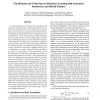Free Online Productivity Tools
i2Speak
i2Symbol
i2OCR
iTex2Img
iWeb2Print
iWeb2Shot
i2Type
iPdf2Split
iPdf2Merge
i2Bopomofo
i2Arabic
i2Style
i2Image
i2PDF
iLatex2Rtf
Sci2ools
154
click to vote
CVPR
2010
IEEE
2010
IEEE
Classification and Clustering via Dictionary Learning with Structured Incoherence
A clustering framework within the sparse modeling and dictionary learning setting is introduced in this work. Instead of searching for the set of centroid that best fit the data, as in k-means type of approaches that model the data as distributions around discrete points, we optimize for a set of dictionaries, one for each cluster, for which the signals are best reconstructed in a sparse coding manner. Thereby, we are modeling the data as a union of learned low dimensional subspaces, and data points associated to subspaces spanned by just a few atoms of the same learned dictionary are clustered together. An incoherence promoting term encourages dictionaries associated to different classes to be as independent as possible, while still allowing for different classes to share features. This term directly acts on the dictionaries, thereby being applicable both in the supervised and unsupervised settings. Using learned dictionaries for classification and clustering makes this method robust...
Related Content
| Added | 03 Sep 2010 |
| Updated | 03 Sep 2010 |
| Type | Conference |
| Year | 2010 |
| Where | CVPR |
| Authors | Pablo Sprechmann, Ignacio Ramirez, Guillermo Sapiro |
Comments (0)

